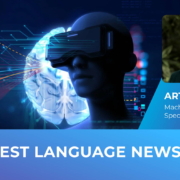The Latest Language News
Let us talk again about the latest language news. I have highlighted the news that I consider the most important.
Penn student co-creates AI-translator to spread awareness about Lenape language
https://www.thedp.com/article/2023/11/student-creates-ai-translator-to-share-lenape-culture
A Penn student has co-created LenaGPT, an AI-powered platform designed to translate indigenous Lenape languages. Engineering freshman Ashmit Dewan andWest-Windsor Plainsboro High School North senior Shiva Tripurana, created the translator. Most existing translation websites, like Google Translate, do not provide English to Lenape translations. LenaGPT allows users to pose questions and receive comprehensive answers, drawing on expertise and collaboration with the Lenape community. The platform facilitates learning and communication by providing translations of Lenape phrases and words. Tripurana and Dewan began developing the program about six months ago, meeting at least twice a week to brainstorm and create a model akin to ChatGPT that offers both translation services and historical information.
Unlike most translation models, which rely on coded algorithms scanning a set of words, LenaGPT employs a large, sophisticated language model that requires extensive information coding. Tripurana is also the founder of LenaLingua, a non-profit created in 2020 to promote the preservation and understanding of Lenape language and culture through computational linguistics. Tripurana and Dewan aim to expand their efforts in preserving the Lenape language to other Indigenous languages. With Penn built on Indigenous land, they hope the community will recognize and protect the language so that future generations may continue to pass on the history and culture of the Delaware people.
Swiss Startup Launches Vidby Call Translator for Google Meet, Over 150 Languages and Dialects
Vidby, a Swiss multi-product IT company specializing in language technologies and development of AI-powered translation solutions, launches the Vidby Call Translator service to allow business teams and individual users to communicate with foreign language participants through Google Meet. Users can translate video calls in real time and understand colleagues globally in over 150 languages.
The video call translation niche is abuzz with solutions, yet existing software faces many hurdles. Vidby positions itself as a leading provider of B2B and, unlike its competitors, well-crafted B2C solutions for real-time video call translation. Users should insert the link to a Google Meet meeting and then connect the vidby call translator bot to the call. For the bot, it is necessary to set languages for each call participant and specify target languages for translation. Once the bot says, “I’m ready,” the users can start the conversation: each participant can speak one at a time, while others keep their microphones on mute.
The key functionalities of the product involve the following:
- Vidby call translator bot that automatically joins a call upon invitation
- List of scheduled calls automatically fetched from the user’s calendar
- List of their screen names from Google Meet (Zoom and Teams are coming soon)
- Speech and voice recognition and real-time translation
- Notifications signaling when the bot can start translating and when the translation is ready
- Call transcription text file
- Translation into the user’s primary language, stored in the user’s profile
- Search for calls by name among upcoming and past calls
Building AI for African languages
https://www.technologyreview.com/2023/11/17/1083637/lelapa-ai-african-languages-vulavula/
Jade Abbott popped open a tab on her computer and prompted ChatGPT to count from 1 to 10 in isiZulu, a language spoken by more than 10 million people in her native South Africa. She then typed in a few sentences in isiZulu and asked the chatbot to translate them into English. And again, the responses? Way off. While there have been efforts to include certain languages in AI models despite the limited training data available, to Abbott, these results show that the technology “really still isn’t capturing our languages.” Many language models like ChatGPT do not perform well for languages with fewer speakers, especially African ones. But a new venture called Lelapa AI, a collaboration between Abbott and a biomedical engineer named Pelonomi Moiloa, aims to use machine learning to create tools that are tailored specifically for Africans. Vulavula converts speech to text and identifies names of people and places in written text. It can currently recognize four languages spoken in South Africa—isiZulu, Afrikaans, Sesotho, and English—and the team is working to include other languages from across Africa. The lack of AI tools that effectively support African languages and recognize African names and places excludes African people from economic opportunities, says Moiloa, CEO and co-founder of Lelapa AI. For her, working to build Africa-centric AI solutions is a way to help others in Africa harness the immense potential benefits of AI technologies.
OpenAI’s GPT-4 has included minor languages like Icelandic. In February 2020, Google Translate added support for five new languages spoken by about 75 million people. But the translations are shallow, the tool often gets African languages wrong, and, according to African AI researchers, it is still a far cry from an accurate digital representation of African languages. Ethiopian computer scientist Asmelash Teka Hadgu conducted the same experiments that Abbott ran with ChatGPT at a premier African AI conference in Kigali, Rwanda. When he asked the chatbot questions in his native language of Tigrinya, the answers he received were incomprehensible. Lelapa AI and Lesan are just two of the startups developing speech recognition tools for African languages. In February, Lelapa AI raised $2.5 million in seed funding, and the company plans for the next funding round in 2025. However, African entrepreneurs say they face major hurdles, including lack of funding, limited access to investors, and difficulties in training AI to learn diverse African languages. The AI startups working to build products that support African languages are often left ignored by investors due to the limited size of the potential market, a lack of political support, and poor internet infrastructure. Lelapa AI is trying to create a new paradigm for AI models in Africa. Unlike Western companies, instead of relying solely on the Internet to collect training data for its model, Lelapa AI works both online and offline with linguists and local communities to collect and annotate data, as well as identify use cases where the tool might be problematic. Bonaventure Dossou, a researcher at Lelapa AI specializing in natural-language processing, says that collaborating with linguists enables them to develop a model that is context-specific and culturally relevant.






